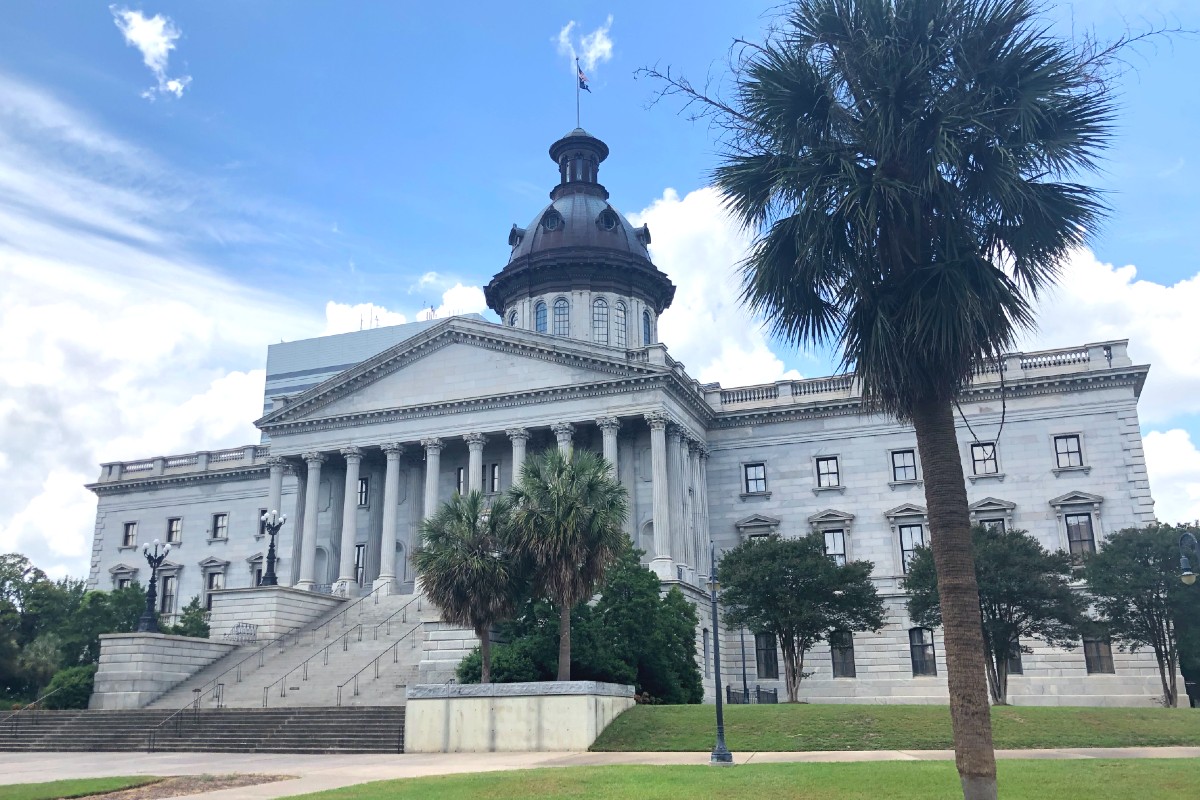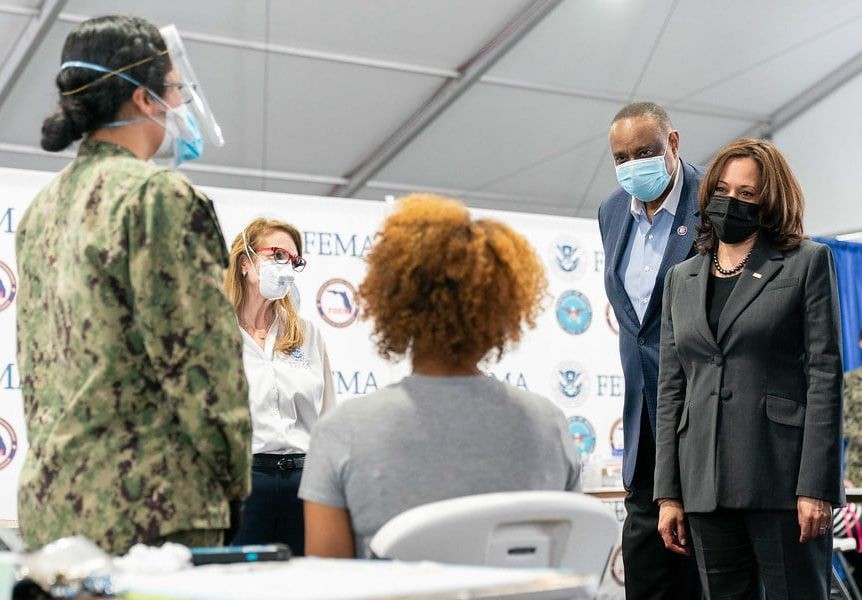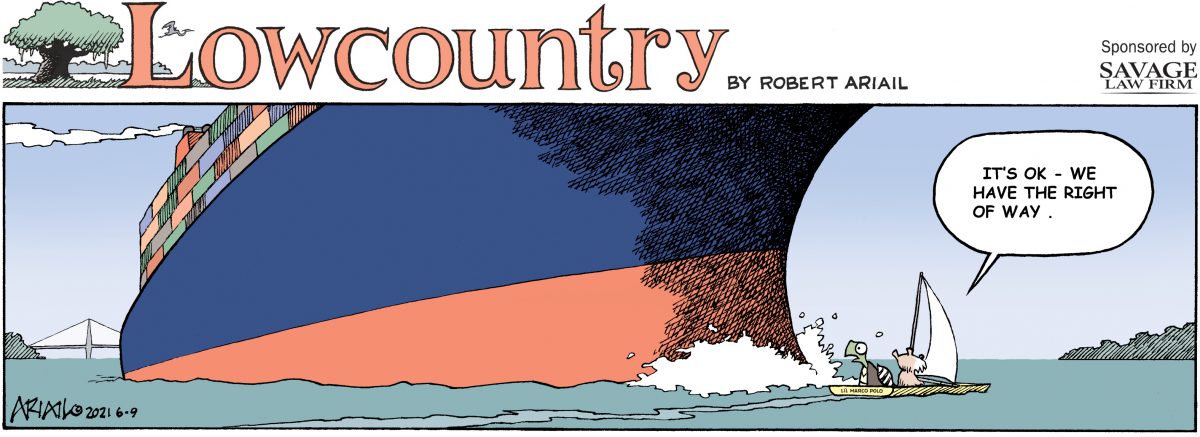STATEHOUSE REPORT | ISSUE 20.24 | JUNE 11, 2021
BIG STORY: Conferees to meet next week on $11 billion budget
NEWS BRIEFS: Harris to be in Greenville Monday for vaccination tour kickoff
LOWCOUNTRY, Ariail: Right of way
COMMENTARY, Brack: Give special treatment to tailgaters
SPOTLIGHT: Charleston Animal Society
MY TURN, Thomas: Should South Carolina cancel Critical Race Theory?
FEEDBACK: McMaster ends “unpolicy” state of emergency”
MYSTERY PHOTO: Cool bridge
Conferees to meet next week on $11 billion budget

Staff reports | House and Senate conferees are expected to meet next week to hammer out differences in the state’s $11 billion budget for 2021-22.
“There are a lot of little details to work out, but we’re not worried about coming to a compromise,” one insider said today.
Perhaps the biggest difference between the budgets approved by the two chambers is in how state employees are paid. The Senate version of the budget calls for a 2 percent across-the-board pay raise for all state employees, while the House version calls for a 3 percent pay raise. Both budgets call for teachers to get $1,000 more in cash above their regular annual increases.
But a measure to give a bonus of $1,200 to all state employees earning less than $50,000 failed on the House floor this week by a 63-50 vote.
Other differences in the budget include three provisions by the House to stro[ some funding to schools and universities if they require masks, COVID testing or vaccines.
The Senate will be represented on the conference committee by Senate Finance Chair Hugh Leatherman, R-Florence, Senate President Harvey Peeler, R-Gaffney, and Sen. Nikki Setzler, D-Lexington. House conferees include Ways and Means Chairman Murrell Smith, R-Sumter, and Reps. Bruce Bannister, R-Greenville, and Jackie Hayes, D-Dillon.
If conferees finish their work next week, all members of the House and Senate are expected to meet the following week to approve the spending plan.
- Next week: A look at the hundreds of millions of dollars to be spent in the coming year on public infrastructure projects.
- Have a comment? Send to feedback@statehousereport.com
Harris to kick off vaccination tour in Greenville Monday

Staff reports | Vice President Kamala Harris will visit Greenville Monday to kick off a national “Month of Action” tour to get more Americans vaccinated against COVID-19.
South Carolina falls short of the national average of 64 percent of adults who are vaccinated. According to the S.C. Department of Health and Environmental Control, about 46 percent of South Carolinians over age 11 have been vaccinated with at least one shot. Some 39 percent have completed their vaccinations. A quarter of the state’s population also is thought to have natural immunity after having contracted the virus. Still, about 1.8 million South Carolinians have no protection from a vaccination or natural immunity, experts say.
In announcing the Month of Action, the White House said it is trying to get 70 percent of Americans vaccinated by July 4. The effort includes free child care for people getting vaccinated, longer hours at pharmacies, more education and outreach, and business incentives.
On Thursday, state health officials reported 119 new confirmed cases of the coronavirus Thursday and zero confirmed deaths. With 5,507 tests reported, 3 percent were positive. Since the beginning of the pandemic, South Carolina has had almost 500,000 people get COVID-19 cases and more than 8,600 confirmed deaths.
In other recent news:
![]() Senators vote “no confidence” in state DJJ director. A group of state senators probing the state’s juvenile prison system voted Wednesday to say they have no confidence in Director Freddie Pough. Meanwhile, Gov. Henry McMaster, who appointed Pough, issued a statement Wednesday that said private security would immediately help with staffing shortages. More: AP News | The Post and Courier.
Senators vote “no confidence” in state DJJ director. A group of state senators probing the state’s juvenile prison system voted Wednesday to say they have no confidence in Director Freddie Pough. Meanwhile, Gov. Henry McMaster, who appointed Pough, issued a statement Wednesday that said private security would immediately help with staffing shortages. More: AP News | The Post and Courier.
Santee Cooper survives as public company. South Carolina’s state-owned utility, Santee Cooper, has had an uncertain future since July 2017, when halted construction before the completion of a nuclear project left the company billions in debt. More: SC Public Radio | The Post and Courier.
Initial S.C. unemployment claims top 900k since March 2020. For the week ending June 5, 1,887 claims were filed in South Carolina, bringing the total filed since March 15, 2020 to 900,665. Spartanburg County saw a state-high 130 claims filed. More: Columbia Business Report.
Safety concerns remain over S.C.’s new open carry law. The 90 days between the day the bill was signed into law and its implementation allows more time for law enforcement and permit holders to learn what the law changes and what it does not. More: SC Public Radio.
SLED says 2020 saw higher rate of violent crime. The State Law Enforcement Division has released a report showing that violent crime increased in 2020, and local departments are saying it could be even higher for 2021. More: The Sumter Item.
Condemned men seek stay from federal judge. Attorneys for two death row inmates condemned to die on June 18 and June 25 have asked U.S. District Judge Bryan Harwell to block their executions while a lawsuit over the state’s new law forcing inmates to choose between electrocution or firing squad proceeds. A circuit court judge declined to stay the executions in a decision earlier this week. Harwell did not indicate on Wednesday how he would decide. More: AP News.
State high court nixes lifelong sex offender registry. The state’s Supreme Court ruled Wednesday that a state law requiring sex offenders to register for life, without prior judicial review, is unconstitutional since it “violates due process.” The Justices set a 12-month timeline to implement the ruling. More: AP News.
- Have a comment? Send to: feedback@statehousereport.com.
Right of way

Cartoonist Robert Ariail always has an interesting take on what’s going on in South Carolina. His weekly “Lowcountry” strip is originally drawn for our sister publication, the Charleston City Paper. Love the cartoon? Hate it? What do you think: feedback@statehousereport.com. Check out the Best of Charleston 2021.
Give special treatment to tailgaters

By Andy Brack, editor and publisher | Tailgaters deserve a special place in hell.
 Not the folks who enjoy a beer and a brat in a parking lot party at a football game. But the selfish drivers who sneak into your rearview mirror and perch one car length off your bumper as you’re sailing down the interstate at 70 mph.
Not the folks who enjoy a beer and a brat in a parking lot party at a football game. But the selfish drivers who sneak into your rearview mirror and perch one car length off your bumper as you’re sailing down the interstate at 70 mph.
Those people. They need to spend time on earth in jail and in a rather hot place in the sweet hereafter.
What kind of driving nut thinks it is actually safe to hug the rear of another car at high speeds? Ever hear of the reaction time needed to stop a car safely if the one in front slows or does something unpredictable (perhaps because a nut is on their rear end)?
“The closer you get to the car ahead, the sooner you will meet an injury attorney,” observed North Charleston attorney Gary A. Ling.
Following a vehicle too closely in South Carolina is illegal, although you wouldn’t know it from driving in the state. It’s a misdemeanor that carries a penalty of up to a measly $100 fine or 30 days in jail.
We doubt few tailgaters receive any such penalty. Most face zero justice as their illegal driving rarely gets on the radar of the few law enforcement officers on highways these days.
State lawmakers need to rein in the Wild West driving show in South Carolina by upping the penalty on tailgaters and making police enforce it. Bump the fine to $10,000. Make it a year in jail if someone causes a wreck when following too closely.
According to the National Highway Transportation Safety Board, if it seems like there is more rude and obnoxious behavior on the road these days, there is — simply because there are more drivers crammed on the highways.
But “a motor vehicle insulates the driver from the world. Shielded from the outside environment, a driver can develop a sense of detachment, as if an observer of their surroundings, rather than a participant. This can lead to some people feeling less constrained in their behavior when they cannot be seen by others and/or when it is unlikely that they will ever again see those who witness their behavior.”
So they do what they want to when they want to, including tailgating to intimidate other drivers to get out of their way.
If you think things have gotten bad in the political sphere with overzealous rhetoric and attacks, just take to the highways and it won’t be long before you encounter aggressive drivers who don’t care for your safety or theirs.
So what should you do when you encounter a tailgater? Probably what you don’t want to do: Get out of their way by signaling that you’re moving into another lane, if you can. It’s probably the last thing you want to do because it reinforces the other driver’s atrocious driving, but it will keep you and your passengers safer.
AAA says you need to keep some distance between your car and the car ahead. Here’s how: when the car ahead passes a fixed point, such as a sign, you need to make sure you pass that point at least two seconds later. Otherwise, you’re too close.
“If you think another car is driving too slowly and you are unable to pass, pull back and allow more space, not less. That way if the car does something unexpected you will have time to get out of the way. You should be able to see the headlights of the car behind you in your rear-view mirror. If you feel you are being followed too closely, signal and pull over to allow the other driver to go by.”
Driving is a privilege, not a right. Be more courteous. If you see a particularly bad tailgater, take down the license plate and call the police or S.C. Highway Patrol (*HP).
- Have a comment? Send to: feedback@statehousereport.com.
Charleston Animal Society
 We’re pleased today to shine our spotlight on the Charleston Animal Society, leader in the effort to make Charleston County a safe place for animals. Now the society is working to expand its Charleston success statewide to energize the state to reshape its 300-plus shelters and animal organizations into a no-kill network that stretches from Walhalla to Little River to Daufuskie Island.
We’re pleased today to shine our spotlight on the Charleston Animal Society, leader in the effort to make Charleston County a safe place for animals. Now the society is working to expand its Charleston success statewide to energize the state to reshape its 300-plus shelters and animal organizations into a no-kill network that stretches from Walhalla to Little River to Daufuskie Island.
Safe and healthy communities, neighborhoods and families don’t just happen – they’re built. “No Kill – No Harm – No More” shines a spotlight on animal abuse and family violence, which are often perceived and treated as separate issues. However, animal abuse is often the tip of the iceberg to larger issues in the home, such as child abuse, elder abuse or domestic violence.
- South Carolina’s most honored charity four years in a row
- National model for success
- Southeast’s only AAHA-accredited combined clinic and shelter
- Focused on solving problems rather than reacting to them year after year
- Publishes Carolina Tails, the largest pet magazine in S.C.
- No Kill. No Harm. No More. is a “movement” comprised of two major initiatives: No Kill Charleston and No Kill South Carolina.
- Learn more about the Charleston Animal Society and its work to create a network of humane network for the animals that bring joy to our lives.
Should South Carolina cancel Critical Race Theory?
By P.L. Thomas, special to Statehouse Report | Legislators in at least 15 states have introduced bills seeking to restrict how teachers can discuss racism, sexism and other social issues, according to Education Week.

In its 2021-22 budget (section 1.105), South Carolina has joined Republicans across the U.S. challenging Critical Race Theory (CRT) and the 1619 Project, and State Superintendent Molly Spearman has proclaimed CRT “ideology has no place in South Carolina schools and classrooms.”
Two aspects of this attack on CRT are important to address. First, CRT is not a curriculum or program, but an obscure scholarly theory found in law programs not in K-12 education.
Second, most critics never define CRT, which Victor Ray, a professor of sociology at the University of Iowa, describes as follows:
“Critical race theory arose to explain why structural racism endures…. Despite internal disagreements, critical race theorists have documented a stunning (and disturbing) array of racial inequalities that can’t be explained by the acts of individual racists.”
Simply put, CRT examines situations around race through the lens of structural, not individual, racism. For example, using CRT to understand police killing Black people at a higher rate than white people is grounded in Black people being perceived as older than their biological age (consider Tamir Rice), not necessarily that individual police officers are racists.
Legislation aimed at CRT or the 1619 Project threatens academic freedom and the education of South Carolina students. As Eesha Pendharker reports in EdWeek: “[E]xperts say the laws ultimately will unravel years of administrators’ fitful efforts to improve educational opportunities and academic outcomes for America’s children of color, who today make up the majority of the nation’s student body.”
What, then, might these attacks “unravel”?
- Diversity, equity, and inclusion (DEI) training (implicit bias, systemic racism and racial privilege, microaggressions). This training is common for educators and students, but worth monitoring because DEI training can be ineffective or serve as superficial distractions allowing schools to avoid harder diversity work.
- Diversifying faculty and the curriculum. Public school teachers are about 80 percent white, less diverse than society and students in public school. which are increasingly Black and brown. Also, a greater representation of Black and brown voices and history have been included in what students are taught, typically in English/ELA and history/social studies. Diversifying the curriculum has prompted controversial legislation by Republicans, however.
- Implementing culturally relevant teaching. The work of Gloria Ladson-Billings is found in K-12 education. Culturally relevant teaching, as she defines it, is “a threefold approach to ensuring that all children are successful. That approach requires a focus on students’ learning, an attempt to develop their cultural competence, and to increase their sociopolitical or critical consciousness.” This focus seeks to honor all children while acknowledging that differences remain among students by race, gender, culture, etc.
- Adopting responsive discipline. Research over decades has revealed racially inequitable discipline in schools, popularly known as the school-to-prison pipeline. Many schools have reconsidered inequitable practices such as zero-tolerance policies and expulsion/suspension, for example.
- Expanding educational access and improving educational quality for children of color. Black and brown students are under-represented in advanced programs, such as Advanced Placement and gifted programs, and often are taught by teachers with the least experience and who are under-/un-certified. Public schools, instead of being a “great equalizer,” often reflect and perpetuate inequity.
Cancelling Critical Race Theory and the 1619 Project is political theater, a solution in search of a problem. Race and racism remain a significant part of life and education in South Carolina. Republicans are poised to ruin the needed, but incomplete, work identified above.
It is critical that teachers and students are free to know the truth of our past and our present so we can create the future we believe is possible.
Thomas is an education professor at Furman University. Have a comment? Send to: feedback@statehousereport.com.
McMaster ends “unpolicy” state of emergency”
To the editor:
![]() Since the pandemic began, Gov. Henry McMaster has ignored or misdirected state pandemic policy. Shadow policies made up ignoring science find its way into education and housing rent policy. The McMaster fictions and policy mismanagements throughout the pandemic were:
Since the pandemic began, Gov. Henry McMaster has ignored or misdirected state pandemic policy. Shadow policies made up ignoring science find its way into education and housing rent policy. The McMaster fictions and policy mismanagements throughout the pandemic were:
- Diverting $500,000,000 to the state unemployment fund in excess to what was needed as people languished.
- The undercutting of the state epidemiologist’s legal recommendations was seen in the early TV press briefings.
- The state’s non-shutdown in which we were essential or easily could get a waiver from him. (Everyone could be essential).
- The early economic resumption claim, despite being already open as there was no real shutdown.
- The mismanaged state-supervised COVID-19 testing program.
- The confused local-state masking policy contradictions.
- Usurpations of the school education safety policy offering, such as five-day school at the height of the spread.
- The made-up rights of parents to not mask their children.
- Contraventions of the legal local responsibilities of local education boards to protect all children.
- No central administrative support to use $3 billion of educational funds. The delay is induced using a bottom-up request process.
- Diverting attention to a lottery for vaccination, instead of working to raise the rates that are low enough to raise concerns of a resurgence spike.
- Delaying distribution of rental assistance.
- Unpolicying the S.C. COVID-19 unpolicy.
— Fred Palm, Edisto Island
Send us your thoughts, but also provide contact info
We receive a few comments a week and look forward to publishing. But often we can’t because we can’t verify the identity of the writer.
To be published, you’ve got to provide us with contact information so we can verify your letters. Verified letters to the editor are published weekly. We reserve the right to edit for length and clarity. Comments are limited to 250 words or less. Please include your name and contact information.
- Send your letters or comments to: feedback@statehousereport.com
Cool bridge

A reader writes that he recently got stuck on his boat on a South Carolina river. So what better to do than snap a picture of this cool bridge. Where is it? Send your guess to feedback@statehousereport.com — and remember to include your name, home city and contact information.
 Last week’s mystery, “Looks religious,” was a picture sent in by Thomas Jacobsen of Sitka, Alaska. It shows an old ice house that was part of Bleak Hall Plantation and is now at Botany Bay Plantation Heritage Preserve and Wildlife Management Area on Edisto Island.
Last week’s mystery, “Looks religious,” was a picture sent in by Thomas Jacobsen of Sitka, Alaska. It shows an old ice house that was part of Bleak Hall Plantation and is now at Botany Bay Plantation Heritage Preserve and Wildlife Management Area on Edisto Island.
Congratulations to Elizabeth Jones and Jay Altman, both of Columbia; Robert Ariail of Camden; George Graf of Palmyra, Va.; Bill Segars of Hartsville; David Lupo of Mount Pleasant; and Allan Peel of San Antonio, Texas.
Peel provided a little more information on the circa-1840 ice house, one of three remaining outbuildings at the plantation. “The ice house does look like a religious building of sorts. But in this case … looks are definitely deceiving. This building was built with mock tracery windows and doors to emulate a Gothic Revival style, thereby adding some elegance to a boring, but critically functional, outbuilding on the plantation.”
- Send us a mystery. If you have a photo that you believe will stump readers, send it along (but make sure to tell us what it is because it may stump us too!) Send to: feedback@statehousereport.com and mark it as a photo submission. Thanks.
 ORDER NOW: Copies are in Lowcountry-area bookstores now, but if you can’t swing by, you can order a copy online today.
ORDER NOW: Copies are in Lowcountry-area bookstores now, but if you can’t swing by, you can order a copy online today.
ABOUT STATEHOUSE REPORT
Statehouse Report, founded in 2001 as a weekly legislative forecast that informs readers about what is going to happen in South Carolina politics and policy, is provided to you at no charge every Friday.
Meet our team
- Editor and publisher: Andy Brack, 843.670.3996
- Special correspondent: Lindsay Street
Donate today
We’re proud to offer Statehouse Report for free. For more than a dozen years, we’ve been the go-to place for insightful independent policy and political news and views in the Palmetto State. And we love it as much as you do.
But now, we can use your help. If you’ve been thinking of contributing to Statehouse Report over the years, now would be a great time to contribute as we deal with the crisis. In advance, thank you.
Buy the book
Now you can get a copy of editor and publisher Andy Brack’s We Can Do Better, South Carolina! ($14.99) as a paperback or as a Kindle book ($7.99). . The book of essays offers incisive commentaries by editor and publisher Andy Brack on the American South, the common good, vexing problems for the Palmetto State and interesting South Carolina leaders.
More
- Mailing address: Send inquiries by mail to: P.O. Box 21942, Charleston, SC 29413
- Subscriptions are free: Click to subscribe.
- We hope you’ll keep receiving the great news and information from Statehouse Report, but if you need to unsubscribe, go to the bottom of the weekly email issue and follow the instructions.
- Read our sister publications: Charleston City Paper (every Wednesday) | Charleston Currents (every Monday).
- © 2021, Statehouse Report, a publication of City Paper Publishing, LLC. All rights reserved.
















 We Can Do Better, South Carolina!
We Can Do Better, South Carolina!
Thanks for running McM unpolicy policy. Today it spread to food support. An amazing insensitivity to people in different situations. Homogeneous Henry.